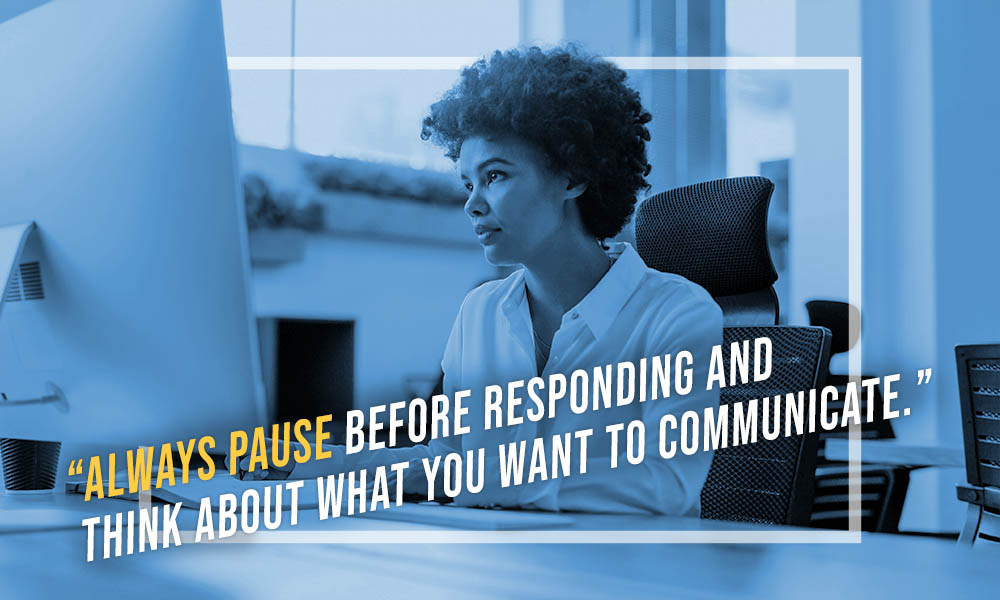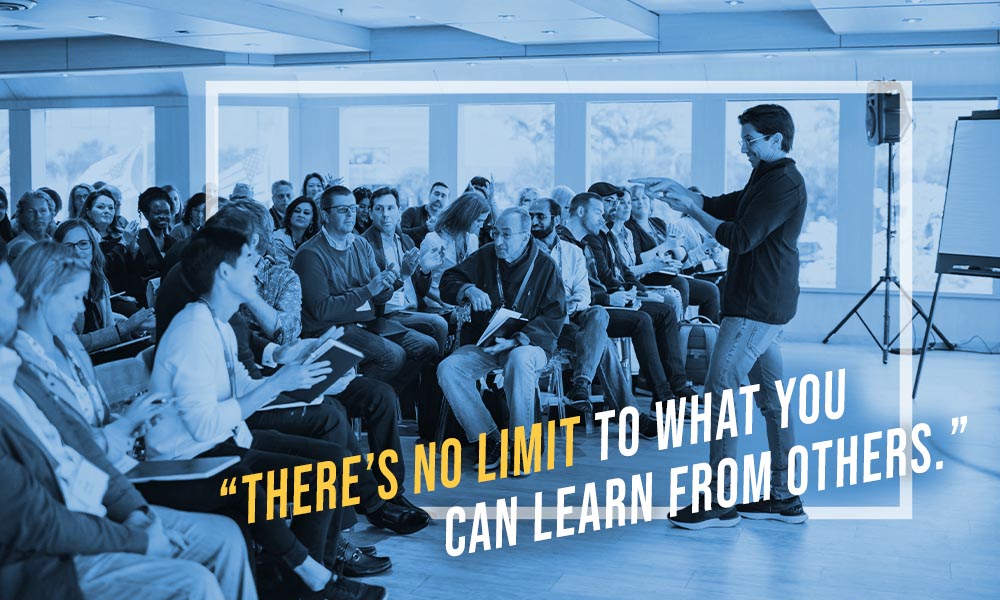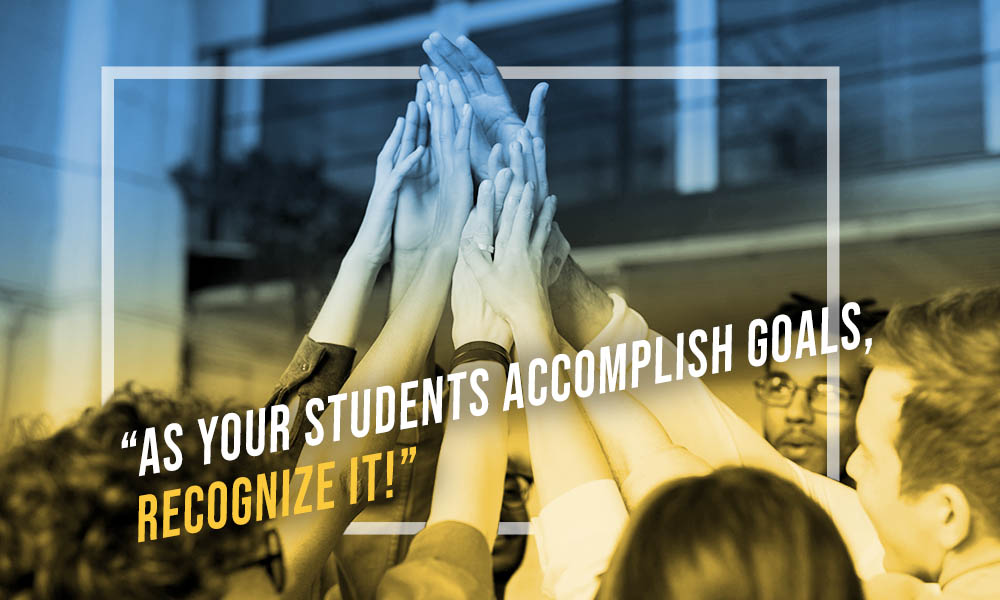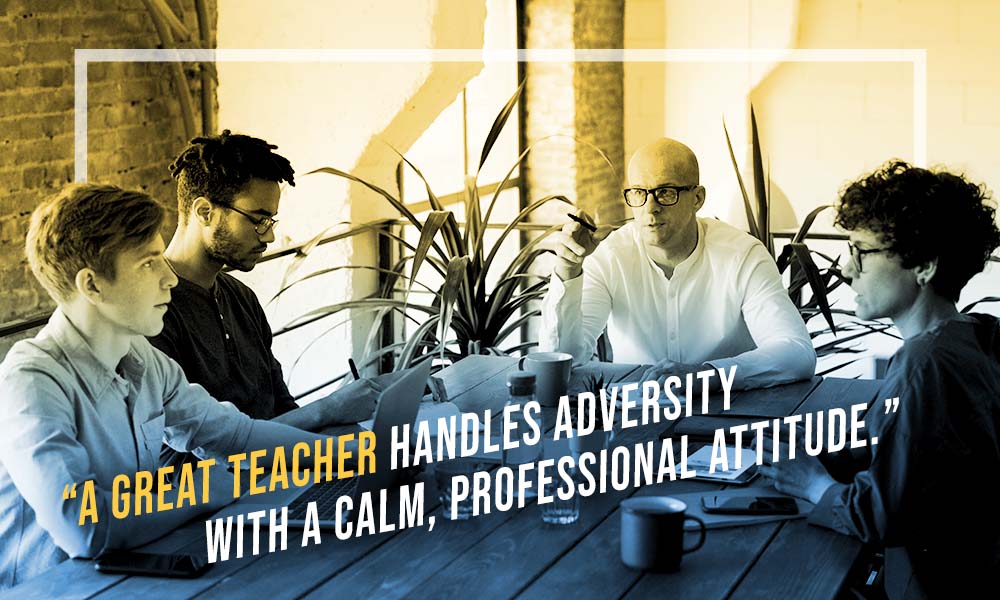If the word “teacher,” makes you think of blackboards, red apples and yellow pencils, you wouldn’t be wrong… at least, not fully.
When we think of teachers, we do typically think of classroom educators. But life’s teachers aren’t confined to the education system. Not at all! Learning doesn’t stop once you graduate high school—and it can take several shapes.
We are firm believers in self-education and continuous education here. Beyond the classroom, you’ll find teachers in all kinds of learning environments—as mentors, counselors, volunteers and online thought-leaders.
And students are increasingly looking for opportunities to learn beyond the traditional classroom setting. Between the rising cost of tuition and living expenses to the fear of leaving a salary (and benefits!) behind for school and a murky economy, people are searching for fresh ways to learn practical, real-world skills.
That’s where you come in!
The self-education market allows those who have been there, done that to share what they’ve learned in real-time, with real students. And this shift from theory-based teaching to experience-based teaching is turning good teachers into great teachers.
If you want to become a great teacher, there are a handful of essential skills you need to have. Surprisingly, a lot of these top skills are things that educators themselves won’t learn in school.
The best teaching skills are learned over time, through experience.
But today, we’re giving you a shortcut.
We’re sharing a crash-course on the teaching skills needed to be a great teacher or, as Dean would say, a “knowledge broker.” Let’s get started!
Important Skills for Becoming a Great Teacher
You don’t need a bachelor’s degree in education to be a great teacher. You don’t even need a degree at all! To be a great teacher, all you need is passion and knowledge, along with these 9 essential skills.
These teaching skills are necessary for any educator, mentor or leader. If you want to be a knowledge broker, you’ll want to be sure you have these skills in your toolbox.
1. Communication Skills

Teaching is the highest level of communication. Not only do teachers have to understand and engage with their students, but they also communicate higher levels of thinking and methods to solve difficult problems.
So, a teacher must have excellent communication skills.
Great teachers use concise written and verbal communication. Their body language is professional yet friendly. If you want to teach your own mastermind program, online course or live training, these skills will help ensure your students understand you clearly and remain engaged with your material.
Similarly, great teachers adapt their communication style to fit the needs of each learner.
Different students, mentees and trainees require different approaches. Needs may vary depending on learning style, age, culture, goal and ability. To be a great teacher, you must be able to communicate your expertise in a way that is both understandable and meaningful to each of your students.
How to Develop Communication Skills
Strong communication skills not only demonstrate your expertise to your students but can also make you more likable—especially if you’re new to the self-education game. There are a few different ways you can improve your written, verbal and non-verbal communication to become an effective teacher:
- Listen, listen, listen: Great teachers make an impact on their students because they truly listen to what they have to say. Next time you rush to respond, ask yourself if you’ve truly listened to the meaning behind the message.
- Think before you speak: When someone is learning from you, what you say matters. This is true no matter who you’re teaching. Students are impressionable—and what a trusted teacher says can hold a lot of weight. Always pause before responding and think about what you want to communicate.
- Body language matters: Even through a video camera, your body language tells a story. If you’ll be hosting students in-person or online, make a conscious effort to uncross your arms, smile and maintain eye contact. Open body language makes you approachable, and students will be more likely to enroll in your course.
- Check your message before you hit send: Messages can get lost in translation, especially in emails and written notes. Without the human emotion behind these messages, your intentions can get mixed up by your reader. Always double-check your message before hitting send and remember to be specific and clear.
Bonus tip: When in doubt, opt for an in-person meeting or video call. These are more personal than email and have a greater chance of getting your point across clearly.
2. Interpersonal Skills

Interpersonal skills are super important to be a great teacher but can be difficult to sum up in a pitch or cover letter. They’re a combination of your people skills, social skills, personality and character traits, and emotional and social intelligence.
In short, your interpersonal skills are the skills that help you fit in and get along with others. These skills also help you connect with students on a deeper level. They’re a combination of what makes you, you.
When you enter the self-education industry, nothing is more important than finding the students who will become your biggest fans and lifelong clients. Clients want to do business with people they know, like and trust, so this is truly an opportunity for your interpersonal skills to shine.
How to Develop Interpersonal Skills
Becoming a knowledge broker means extracting your passion and knowledge, and sharing it with those who need it most anywhere in the world. This borderless way of learning requires all of your interpersonal skills, from your personality and attitude to your motivation level and manners. To boost your interpersonal skills, take steps to:
- Practice empathy and active listening: Great teachers deliver the material they know their students need. To better understand what your students want to learn, and how they prefer to learn, you need to pay close attention to what they have to say.
- Develop a positive mindset: Improve your attitude and motivation with a positive mindset. Positivity is contagious, even in a digital setting. Plus, remaining high-energy ensures your students won’t go elsewhere for your knowledge.
- Control your emotions: You’re allowed to have rough days, but you have to be aware that you have people who look up to you. You’re a role model to them, and what you do and say matters. That’s why it’s important to learn how to control your emotions (such as pent-up anger) to avoid losing respect.
- Show a genuine interest in the people around you: Everyone wants to feel valued. Great teachers take the time to interact with their students and become invested in their success.
Bonus tip: Acknowledge others’ opinions! As a teacher, you should appreciate various perspectives and welcome ideas from students and fellow knowledge brokers alike.
3. Critical Thinking Skills

Let’s be real: Teachers need to be able to think critically.
In the digital landscape, great teachers extract their expertise and market it to potential students. They rise to meet the demand for new content, courses and programs, and they have the hindsight to focus on their specialization.
Teachers must answer difficult questions from students right on the spot and figure out how (or if) certain knowledge applies to specific student’s goals. They revise lesson plans or meeting agendas on the fly and adapt to whatever life throws at them (we’re looking at you, COVID-19).
A good teacher has excellent critical thinking skills to manage all of these responsibilities and then some.
How to Develop Critical Thinking Skills
Teaching skills beyond traditional education are so valuable, especially among self-educators. The best teachers can be found anywhere, but a lot of them are online, where critical thinking skills are necessary to succeed.
Fortunately, there are a variety of ways to improve your critical thinking, including:
- Question whatever you don’t understand (and encourage your students to do the same): Challenge basic assumptions. Ask questions to better understand complex subjects. There’s no limit to what you can still learn as you teach.
- Stop, look and listen: Be aware of what’s happening around you. Observe and reflect on how different scenarios create different outcomes for your students.
- Be aware of your mental process: When you have a question, what’s your first move? Do you let it nag at you, or do you seek answers right away? Do you immediately hop on Google or reach out to a peer? Analyze how you process information and how you can improve.
- Always think for yourself: At the core of critical thinking is the ability to use your own brain. Students take your course because they admire your opinion, so remain an independent thinker.
4. Professional Development Skills

No matter if you’re a newbie knowledge broker or an experienced educator, you need professional development. Even the best teachers realize they can still improve, and professional development gives them the tools to do so.
Whether it’s adding to your subject mastery or learning how to improve your communication skills, professional development will help you become a better teacher. Typically, classroom educators have mandatory professional development, but if you’re a trainer, mentor or knowledge broker, it’s important to seek out classes that will give your skills a tune-up—like Dean and Tony’s Knowledge Broker Blueprint course.
Regardless if you have tons of technical skills or years of experience teaching, it never hurts to get a refresher!
How to Make the Most of Professional Development
Professional development goes beyond learning new skills or improving old skills. It’s about using your skills to help guide clients down a career path of continuous improvement. Here’s how to make the most out of professional development:
- Invest in training: Attend a workshop, conference or take a course. You must develop your own skills before you can help others.
- Assess your own progress: Identify areas where you excel professionally and where you could use some help. After you finish training, return to your strengths and weaknesses, and see what’s changed.
- Act deliberately: After professional development courses end, you must put what you’ve learned into action. How can you use what you’ve learned to support the people who learn from you? What are they lacking for their future success?
- Network and make connections: There’s no limit to what you can learn from others. Connect with other knowledge brokers on LinkedIn to reveal alternative ways of learning or teaching that you hadn’t considered.
5. Adaptability Skills

Adaptability skills are massively important for teachers, especially for educators in the virtual knowledge industry or non-traditional learning environments.
As highlighted by the recent COVID-19 pandemic, we’ve seen an increased demand for self-education programs. More individuals are seeking ways to retrain and reposition themselves, both professionally and personally.
Most industries are facing an unprecedented and forced transformation, but teachers? They’re simply adapting their business models to thrive.
How to Develop Adaptability Skills
No matter the circumstances, great teachers provide a positive learning experience.
This means adopting different teaching techniques for students with various learning styles. It also means learning new technology on the fly and adapting lesson plans or meeting agendas last minute.
In most cases, you won’t know the extent of your adaptability skills until you’re put on the spot. But, that doesn’t mean you can’t start working on them now. To improve your adaptability:
- Think outside the box: Life isn’t always black and white. Change your perspective and look at things from a new angle every now and then. What would you do differently?
- Allow for uncertainty: You won’t always have the answers, and that’s okay. The sooner you can accept that you won’t always have a master plan, the easier it will be to adapt to whatever comes next.
- Welcome shifting focus when and where necessary: Don’t be afraid to pivot on a lesson plan or meeting agenda if something more important piques interest. Not everything has to go by the plan.
- Encourage students to explore new avenues: Motivate learners to approach goals with a new mindset (and don’t be afraid to introduce new content that supports these new mindsets).
6. Teamwork Skills

Teaching is a team effort.
It takes the effective skills of a teacher plus the attention of a student to equal a productive learning environment. Student engagement hinges on the student’s desire to succeed as well as the teacher’s investment in the student.
No matter if an educator is in a traditional classroom setting or teaching in a digital learning scenario, there will be a team effort.
Similarly, in the virtual learning industry, teamwork skills also factor into online community building. Great teachers successfully lead a team of past and potential students to create a community of like-minded action-takers (who will pay you monthly).
To become an effective teacher, you must learn to work well with your group and allow your teamwork skills to shine.
How to Develop Teamwork Skills
When it comes to any form of teaching—nontraditional or traditional—teamwork makes the dreamwork. To hone your teamwork skills, consider these tips:
- Communicate, communicate, communicate: Teamwork is about working towards a shared goal. And as the leader, it’s your job to ensure everyone stays on the same page.
- Establish team rules: Rules are important for any team’s success. And it’s up to you to establish the rules. Set the tone for how everyone should work together.
- Recognize and reward success: As your students accomplish goals, recognize it! Celebrate their successes! It will encourage them to keep going.
- Learn to take yourself out of the equation: You know the phrase, “Take one for the team?” To be a great teacher, sometimes you’ll need to focus more on the ultimate goal than on yourself.
7. Organizational Skills

It goes without saying that great teachers need great organizational skills, both physically and mentally. In addition to juggling their own personal responsibilities, the best teachers also keep track of multiple meetings and answer dozens of messages per day.
Even with readily understandable and usable technology (like Dean and Tony’s Knowledge Broker Blueprint course), the most important teaching skills boil down to:
- Confidently extracting your unique knowledge
- Proudly designing your curriculum
- Identifying and connecting with ideal students
To succeed in all of the above, educators must remain organized.
Not to mention, great teachers keep track of each student’s progress and monitor their development to understand what they’ll need to know next. This hindsight to stay organized allows educators to put students on the fast-track to success.
How to Develop Organizational Skills
Your organizational skills have a major impact on your success as a teacher, no matter if your classroom is online or in a school building. Take a look at these steps to build organizational skills:
- Clean your workspace: A clean work area makes it easier for everyone to focus. Establish an area for files, tidy up loose paperwork and clear your desktop of any unwanted files.
- Embrace being an early bird: Set your alarm for a half-hour earlier than normal to give yourself time to collect your thoughts and organize any digital files.
- Be proactive: Make a to-do list and schedule each day. Allow time slots for breaks to take a moment to breathe.
- Minimize interruptions: Turn off your notifications so you’re not distracted as you move through your schedule. They especially need to be turned off when you’re with your students to let them know you’ve set aside this time for them.
Bonus tip: Learn to ask for help! Sometimes it can be hard to juggle everything. If there’s too much on your plate, learn to ask for help. Reach out to someone who can help make your load lighter. That way, you can continue to focus on the important things.
8. Time Management Skills

Time management skills go hand-in-hand with organizational skills. You can have the most impressive to-do list in the world, but it’s no good unless you can actually get those items finished on time.
For great teachers, getting everything done on time requires top-notch time management skills. These skills prevent teachers from racing against the clock to complete tasks. They allow for time to work on professional development, seeking new clients and developing a curriculum.
Time management skills also help teachers when they’re with their students. Proper time management allows teachers to give each student the individual attention they deserve, including scheduling time for questions and discussion.
How to Develop Time Management Skills
If you often find yourself running out of time, you’d be wise to work on your time management skills. Here are some tips to improve your time management:
- Make a schedule and stick to it: Plan full weeks or months ahead when you can, even if it’s just to map out what you’ll cover and when or where to find new students.
- Prioritize and set some boundaries: Your mental health should always come first. Be sure to prioritize your tasks and set time aside for yourself.
- Expect good distractions (and stay away from bad distractions): Life will always throw one or two wrenches in your plans. Use your adaptability and embrace happy distractions, but steer clear of bad ones, like unwanted negativity.
- Never procrastinate: Procrastination just leaves more work for later. Get it done today!
Bonus tip: Get some tech help from software! There are a ton of scheduling apps on the market that can help keep your time management skills in check. Embrace them!
9. Problem-Solving and Conflict Resolution Skills

Great teachers demonstrate patience—especially when handling tense situations or conflict resolution.
You might not think that conflicts can arise when teaching students digitally. After all, these are typically adults you’re dealing with, and students can’t argue in the hallways like in elementary or secondary school. However, the best teachers are actively solving their students’ real-life problems to help guide them towards success.
They help steer learners through complex life situations because they’ve been in their shoes before. They know that real success takes years to achieve, with countless failures along the way.
A great teacher handles adversity with a calm, professional attitude. They are certified experts at problem-solving and conflict resolution, and they know how to maintain a positive attitude.
How to Develop Conflict Resolution Skills
Some people are simply born with more patience than others. However, the emotional control that goes into problem-solving and conflict resolution can be learned.
Conflict-resolution in a digital learning scenario might look different, but typically it includes the ability to:
- Recognize the conflict: Conflict can take the form of passive-aggressiveness between students or discussing life’s challenges during courses. It’s important to recognize these red flags and steer students on a positive path.
- Actively listen and use communication skills: The majority of teaching skills are based on these principles. To find a solution, a leader has to be able to listen to details and communicate calmly.
- Be aware of your own emotions: It’s easy to get caught up in the heat of the moment, especially if a student is discussing a tough time you’ve also gone through. To give your best advice, remove your emotions from the equation.
- Maintain a positive mindset: If you go into problem-solving mode with a negative attitude, you’ll never find a resolution. Keep a positive mindset and encourage your learners to do the same.
Developing the Skills to be an Excellent Teacher
Not everyone goes to school to learn teaching skills, but with practice, everyone can become a great teacher. From interpersonal skills and conflict resolution to time management and communication skills, working on your soft skills can help you become an excellent teacher.
So go ahead and work on these teaching skills! The virtual learning industry is yours for the taking. These tips are invaluable, and you can use them anytime you find yourself in a teaching position.
What teaching skills will you work on in your quest to be a knowledge broker?






One Response